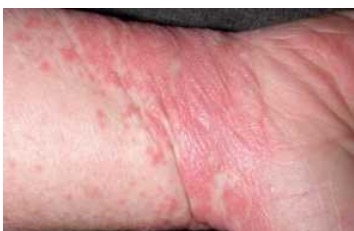Geetha Patil and Dr. K. Rathod
Lichen planus (LP) that resembles Lichen (a fungus and an alga) is a common-chronic inflammatory condition affecting the skin and mucosal surfaces marked by a thick band-like infiltration on the skin and severe itching. It is an autoimmune illness.
Treatment of Lichen Planus in Ayurveda’s holistic approach includes the purging of whole body by Panchakarma treatment that is administered according to dosha dominance in all skin problems. If the lichen planus is not too severe and other conditions are favorable, a combination of Shodhana and Shamanachikitsa, Nidanparivarjan, and Kushthaharadravyprayog can help.
Lichen planus affects approximately 1% of the population worldwide, mostly affecting adults aged between 30 to 60 years. It has no strong racial predilection.
Approximately 10% of those affected have lichen planus of the nails while half of those affected have oral lichen planus, which is more common in women than in men.
What are the types of Lichen planus? There are several clinical types of (LP):
- Cutaneous lichen planus
- Mucosal lichen planus
- Lichen planopilaris
- Lichen planus of the nails
- Lichen planus pigmentosus
- Lichenoid drug eruption
- Oral lichen planus
- Nail lichen planus
- Bullous lichen planus
What are the causes of Lichen planus?
Lichen planus is undoubtedly an immune illness. However, contemporary science has not been able to pinpoint the exact cause of this ailment. It has been discovered that lichen planus patients frequently exhibit some common characteristics such as excessive chemical exposure, liver disease, etc.
- Dependence on Anti-Inflammatory Drugs: Ibuprofen and other common pain relievers can be problematic for certain people. Even if they relieve pain, their chemical response in the body can leave a person susceptible to lichen planus if used for a long time. Quinine, quinidine, and others can cause a lichenoid rash.
- Irritant Medications: If you have high blood pressure, heart disease, or arthritis, double-check your medications. The ingredients in these drugs can wreak havoc on your immune system, causing you to develop lichen planus. ● Infection with Hepatitis C: Hepatitis C, if not treated promptly, people can develop lichen planus. So, pay attention to the changes in your body!
- Genetic predisposition
- Physical and emotional stress
- Injury to the skin; lichen planus often appears where the skin has been scratched or after surgery (koebnerisation)
- Localized skin disease such as herpes zoster
- Contact allergy, such as to metal fillings in oral lichen planus (rare) and color photographic developers.
- Lichenoid inflammation is also notable in graft-versus-host disease.
- Vitamin D deficiency may be associated with oral lichen planus. Its association with other types of LP remains unexplored
What are the Symptoms of LP?
Some symptoms of this condition are lesions, lumps, or rash with a purplish color. These can grow and spread over the body over weeks to months. When the mucosal lining is affected, it might cause problems in the mouth. Some of the symptoms are bluish-white spots on the inside of the cheek, the sides of the tongue, or the gums. The chances of painful and burning sensation is more in this disease. Lesions may be itchy and isolated or group if the skin is afflicted. The skin will be irritating at the rash’s location, and the lesions will be glossy or scaly with a sharp border.
What are the best treatment of Lichen Planus in Ayurveda?
Detoxing the body through Sodhana or Panchakarma: Detoxing the body is a critical stage in most Ayurvedic treatments. It allows the body to rid itself of toxins that have accumulated through Vamana (medicated vomiting) or Virechana as the first treatment (medicated purgation).
Correcting Agni’s function and stopping the formation of more Ama: The body’s Agni, or ‘inner fire,’ may have been diminished by the detoxifying cycle. So, in the next step use light to aid in the digestion of food and the recovery of the Agni.
Pacifying the symptoms: Gargling (Kabbalah) or washing (Dhara) with herbal devotion or applied medication can help calm and soothe the discomfort..
Rasayana or rejuvenating medication: The rejuvenation process begins following the therapy processes to renew and rebuild the body tissues. Rejuvenating drugs that are specifically beneficial to the skin are used at this stage. These provide excellent immunity to prevent the three Doshas from becoming vitiated further.
- Herbs like Dasamoola, Tuvaraka, Pata, Bala, and Ashwagandha can help with predominant Vatha (dry skin lesions).
- Herbs like Brahmi, Mandukaparni, Manjistha, and Liquorice are beneficial in Pitha-dominated circumstances (with inflammatory changes and burning sensations).
- Herbs like Vacha, Triphala, Musta, Bitter Gourd, Patola, Arka, Guluchi, Neem, Aragwadha, Turmeric, and Katuki may help with itching white patches in Kapha-dominated circumstances.
What are the best Homeopathic Remedies for LP?
- Sulphur is best for the patients with papules and extreme skin dryness.
- Merc Sol is the ideal Homeopathic remedy when the main complaint given by the patient is irregular ulcers inside the cheeks.
- Borax is most often used for oral lichen.
- Thuja is also ideal for LP of pigmented variety that is brown-colored spots.
- Antimonium Crudum is recommended for LP with eruptive papules, vesicles, and pustules.
- Arsenic album can be given, when the rashes are very itchy and blisters form after scratching.
- Nat Mur is good for dry eruptions occurring on the bends of the joints and the margins of hairy scalps.
- Kalium Arsenicum is best for intolerable itching, skin dry scaly, wilted LP.







